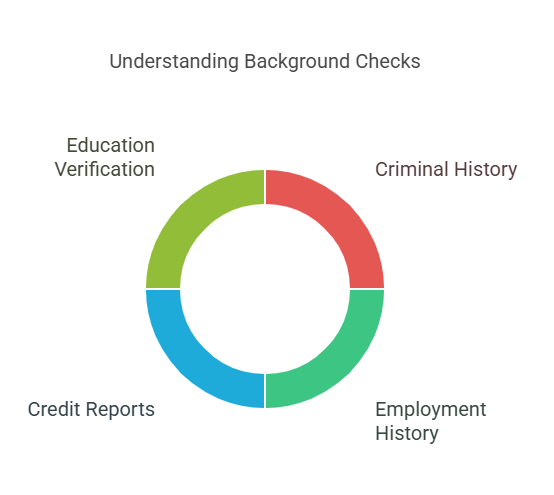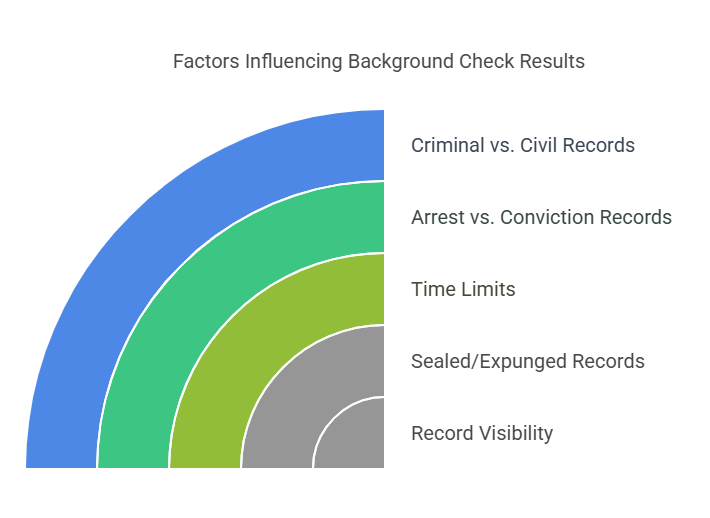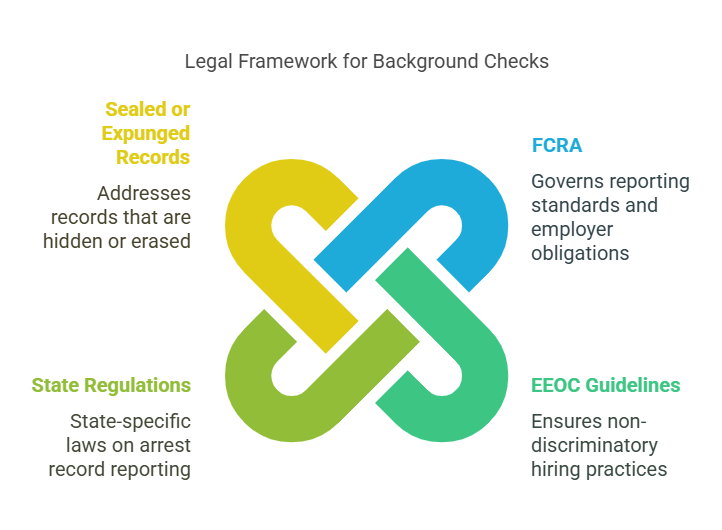How to Understand Background Checks and Arrest Records

Introduction and General Overview
When it comes to background checks, many individuals and employers wonder, “Do arrests show up on background checks?” Understanding the answer to this question is crucial for employers making hiring decisions, landlords screening potential tenants, and individuals wanting to ensure their records are accurate. Arrest records can play a significant role in determining opportunities, which makes it vital to know how they appear on background checks and under what circumstances they might surface.
What Are Background Checks, and Why Are They Important?

A background check is a detailed review of an individual’s history, often performed to verify their suitability for employment, housing, or other opportunities. These checks are typically conducted by employers, landlords, financial institutions, or government agencies.
The purpose of a background check is to provide insights into:
- Criminal History: Ensuring public safety and workplace security.
- Employment History: Verifying past roles and qualifications.
- Credit Reports: Gauging financial responsibility.
- Education Verification: Confirming degrees and certifications.
For employers, background checks help mitigate risks such as fraud, violence, or negligence claims. Landlords use them to avoid renting to individuals with prior evictions or criminal activity, and individuals can use background checks to confirm their records’ accuracy.
Do Arrests Show Up on Background Checks?
Whether arrests appear on a background check depends on several factors, including the type of background check, the jurisdiction, and the outcome of the arrest. Below are the key points to consider:
1. Type of Background Check Conducted
The type of background check determines whether arrest records will be included:
- Criminal Background Checks: These checks often reveal arrests, even if they did not result in a conviction.
- Employment Background Checks: Employers may see arrests depending on the laws in their state and the type of role being filled.
- Tenant Background Checks: These may include criminal records but typically focus on convictions rather than arrests.
- Federal or Security Clearance Checks: These comprehensive checks often include arrest records, regardless of the outcome.
2. Arrests vs. Convictions
A significant distinction exists between an arrest and a conviction:
- Arrests: Indicate someone was taken into custody but does not confirm guilt.
- Convictions: Indicate that the person was found guilty of a crime in a court of law.
In most states, arrests without convictions may still appear on a background check unless specific legal protections are in place.
3. Jurisdiction-Specific Differences
Laws about reporting arrest records vary widely:
- Ban-the-Box Laws: Some jurisdictions have laws preventing employers from considering arrests that did not lead to convictions.
- State-Specific Limitations: States like California, New York, and Illinois limit reporting of certain arrests on employment background checks.
- Sealed or Expunged Records: Arrests that have been sealed or expunged typically will not appear on most background checks.
For example, under the Fair Credit Reporting Act (FCRA), consumer reporting agencies cannot disclose arrests that are older than seven years, unless they resulted in a conviction or the salary of the role exceeds a certain threshold.
Why Understanding Arrests on Background Checks Matters
The presence of arrest records on background checks can impact opportunities for individuals in many areas of life:
- For Employers: Knowing whether an arrest record is relevant and legally reportable ensures fair hiring practices and compliance with laws.
- For Landlords: Screening tenants responsibly helps maintain safe living environments while avoiding discrimination.
- For Individuals: Reviewing personal background checks ensures that inaccurate or outdated information does not affect opportunities.
Factors, Process, and Our Services
Understanding the specific factors that determine whether arrests appear on background checks is essential. In this section, we’ll explore the different elements that influence whether an arrest will show up, the process involved in conducting background checks, and how Exact Background Checks ensures accuracy and compliance throughout.
Factors That Determine Whether Arrests Show Up on Background Checks

Several key factors determine if an arrest record will appear on a background check. These factors include the nature of the record itself, the laws governing reporting, and the type of background check conducted. Let’s explore these in more detail:
1. Criminal vs. Civil Records
A criminal record is typically associated with arrests and convictions related to violations of the law, such as theft, assault, or drug offenses. A civil record, however, relates to legal disputes that do not involve criminal activity, like lawsuits or divorce proceedings.
- Criminal Records: Arrests and convictions related to crimes are usually included in criminal background checks. Even if an arrest did not lead to a conviction, it can still appear unless it is sealed or expunged.
- Civil Records: These do not usually include arrests unless they pertain to criminal offenses that resulted in civil suits.
2. Arrest Records vs. Conviction Records
While arrest records indicate that an individual was taken into custody, they do not necessarily confirm guilt. Arrest records can appear on background checks unless legally restricted. In contrast, conviction records are the result of a legal judgment, confirming guilt, and these tend to be far more significant in most background checks. Here’s how they differ:
- Arrest Records: Can appear on criminal background checks but may not hold as much weight, especially if the arrest did not result in a conviction or the charges were dropped. Some jurisdictions may limit or prevent employers from considering arrests without convictions.
- Conviction Records: These are more likely to show up on background checks because they reflect a legal determination of guilt. Convictions are typically seen as more significant and can influence employment or housing decisions more heavily.
3. Time Limits for Reporting Arrests
Federal and state guidelines impose limitations on how far back an arrest record can be reported in background checks:
- Federal Guidelines (FCRA): Under the Fair Credit Reporting Act (FCRA), arrest records may not be reported for jobs that pay less than $75,000 per year if the arrest occurred more than seven years ago. However, if the arrest led to a conviction, the record may be reported regardless of time passed.
- State-Specific Regulations: Different states have different rules about how far back arrest records can be reported, and some states may restrict employers from considering arrests that did not lead to convictions, especially if they are older than a certain number of years.
4. Sealed or Expunged Records
When an arrest record is sealed or expunged, it is no longer publicly accessible and typically does not appear on most background checks. Expungement or sealing of records is a legal process that removes or hides the record from public view. Expunged or sealed records are generally not available to employers or landlords conducting background checks. However, certain types of background checks, such as those required for government or law enforcement positions, may still uncover sealed or expunged records.
The Background Check Process
Background checks are carried out using databases and records from multiple sources. Here’s a breakdown of how background checks are conducted:
1. Accessing Databases
Background check agencies, such as Exact Background Checks, use a variety of national and local databases to gather information about a person’s criminal history, employment history, and more. These databases may include:
- National Criminal Databases: They provide access to criminal records from across the country. However, these databases may not include every jurisdiction, so additional searches may be necessary.
- State and County Criminal Records: These databases are often more comprehensive and may provide more accurate details about specific arrests and convictions in that jurisdiction.
- Sex Offender Registries: Available through government websites, these lists identify individuals convicted of sex crimes.
- Employment Records: These records can provide information about past jobs, verifying employment dates, positions held, and reasons for leaving.
2. Role of Screening Agencies
When conducting a background check, screening agencies like Exact Background Checks help ensure compliance with the law, particularly with regulations like the Fair Credit Reporting Act (FCRA) and Equal Employment Opportunity Commission (EEOC) guidelines. They also ensure that the background check information is accurate, up-to-date, and legally permissible.
The steps typically involve:
- Requesting Consent: An employer or landlord must obtain written consent from the individual before conducting a background check.
- Collecting Data: Screening agencies access various databases and records to gather information on the individual.
- Reporting Results: After gathering all relevant data, the background check agency compiles the information into a report, which is then provided to the employer or landlord.
- Compliance Review: The agency ensures that the background check complies with all legal requirements, such as reporting limitations and disclosure requirements.
Exact Background Checks Services
Exact Background Checks provides comprehensive background screening services for employers, landlords, and individuals. We specialize in offering:
- Criminal History Checks: We help employers assess the criminal background of job candidates and ensure that arrests and convictions are handled accurately and legally.
- Tenant Screening: Our services ensure that landlords can confidently evaluate prospective tenants, including checking for prior arrests or criminal behavior.
- Employment Verification: We offer detailed verification of past employment, helping employers verify qualifications and job histories.
- Custom Reports: We tailor our reports to meet specific needs, whether it’s for employment, housing, or other purposes.
By leveraging Exact Background Checks, you ensure a comprehensive, compliant, and efficient screening process that protects both employers and individuals. Our services help prevent risks and provide a clear view of an individual’s background while maintaining compliance with all applicable laws.
Types of Records Included in a Typical Background Check
The following is a table outlining the types of records typically included in a standard background check and whether or not arrest records appear:
| Record Type | Included in Background Check? |
|---|---|
| Criminal Arrest Records | May appear depending on the jurisdiction and whether they resulted in a conviction |
| Conviction Records | Always included if the individual was convicted of a crime |
| Civil Court Records | Typically not included unless related to criminal behavior |
| Employment History | Always included |
| Educational Background | Always included if verified |
| Drug Screening | May be included in certain roles (especially for safety-sensitive positions) |
Legal Aspects of Reporting Arrests on Background Checks

Background checks must adhere to a variety of legal requirements. These laws protect individuals’ rights while ensuring that employers, landlords, and other entities conducting screenings do so in a fair and compliant manner. Let’s review the key legal considerations regarding arrests on background checks:
1. Fair Credit Reporting Act (FCRA)
The Fair Credit Reporting Act (FCRA) governs how consumer information is collected, used, and reported, including arrests. The FCRA sets standards for what information can be reported and for how long. Here are the key provisions relevant to arrest records:
- Time Limitations: Under the FCRA, arrest records generally cannot be reported if they occurred more than seven years ago, unless they resulted in a conviction or the position being applied for exceeds a salary threshold (usually $75,000 per year).
- Disclosure Requirement: Employers must inform applicants if they plan to use a background check in the hiring process, and they must obtain the applicant’s written consent.
- Adverse Action: If an employer decides not to hire an individual based on their arrest record or other information from a background check, they must notify the individual, giving them an opportunity to dispute the findings.
2. Equal Employment Opportunity Commission (EEOC) Guidelines
The EEOC enforces federal laws that prohibit discrimination in the workplace. When it comes to criminal background checks, the EEOC has guidelines to ensure that employers are not unfairly discriminating against candidates based on their arrest records. According to the EEOC:
- Arrests Without Convictions: Employers should not automatically disqualify a candidate based on an arrest alone. Arrests indicate involvement in an incident but do not confirm guilt, so decisions should be based on whether the arrest is relevant to the job in question.
- Convictions: Employers can consider convictions when making hiring decisions, but they must consider the nature of the conviction, how recent it is, and its relevance to the job.
3. State-Specific Regulations
Different states have varying laws regarding how long arrest records can be reported, whether arrests without convictions can be considered, and whether certain offenses must be disclosed. For example:
- California: Employers cannot ask about or consider an arrest that did not result in a conviction on job applications.
- New York: Employers are prohibited from asking about arrests that did not lead to a conviction unless they are directly relevant to the position.
- Texas: Employers can inquire about arrest records but must provide an opportunity for applicants to explain the circumstances.
It is essential to be aware of the specific state laws that apply to background checks to ensure compliance and avoid potential legal issues.
4. Sealed or Expunged Records
Arrests that have been sealed or expunged (legally erased or hidden from public view) generally cannot be reported on a background check. However, specific types of background checks, such as those for government or law enforcement positions, may still access these records.
Frequently Asked Questions (FAQs)
Below are some of the most frequently asked questions related to arrests and background checks:
Do arrests always show up on background checks?
No, arrests do not always show up. It depends on factors like the type of background check, jurisdiction, and outcome of the arrest. Arrests without convictions may still appear unless legal protections are in place.
What is the difference between an arrest and a conviction, and how do they appear on background checks?
An arrest indicates someone was taken into custody but doesn't confirm guilt. A conviction means someone was found guilty in court. Arrests may appear on background checks, especially criminal checks, but convictions are more significant and almost always appear.
What are some legal protections that limit the reporting of arrests on background checks?
Legal protections include:
- Ban-the-Box Laws: Prevent employers from considering arrests without convictions in some jurisdictions.
- State-Specific Limitations: Varying state laws limit reporting of certain arrests.
- Sealed or Expunged Records: Arrests that have been sealed or expunged typically do not appear.
- Fair Credit Reporting Act (FCRA): Limits reporting of arrests older than seven years (unless resulting in conviction or for high-paying roles).
How do employers and landlords use arrest records in background checks?
- Employers: Use them to assess risk, but must comply with laws like FCRA and EEOC guidelines, ensuring fair hiring practices.
- Landlords: Use them to screen tenants for safety, but typically focus on convictions rather than arrests.
What factors determine whether an arrest record will appear on a background check?
Key factors include:
- Criminal vs. Civil Records: Criminal records include arrests; civil records generally don't.
- Arrest Records vs. Conviction Records: Convictions are more significant.
- Time Limits for Reporting Arrests: Federal and state guidelines limit how far back arrests can be reported.
- Sealed or Expunged Records: These typically do not appear on most background checks.
Do arrests always show up on background checks?
No, arrests do not always show up. It depends on factors like the type of background check, jurisdiction, and outcome of the arrest. Arrests without convictions may still appear unless legal protections are in place.
What is the difference between an arrest and a conviction, and how do they appear on background checks?
An arrest indicates someone was taken into custody but doesn't confirm guilt. A conviction means someone was found guilty in court. Arrests may appear on background checks, especially criminal checks, but convictions are more significant and almost always appear.
What are some legal protections that limit the reporting of arrests on background checks?
Legal protections include:
- Ban-the-Box Laws: Prevent employers from considering arrests without convictions in some jurisdictions.
- State-Specific Limitations: Varying state laws limit reporting of certain arrests.
- Sealed or Expunged Records: Arrests that have been sealed or expunged typically do not appear.
- Fair Credit Reporting Act (FCRA): Limits reporting of arrests older than seven years (unless resulting in conviction or for high-paying roles).
How do employers and landlords use arrest records in background checks?
- Employers: Use them to assess risk, but must comply with laws like FCRA and EEOC guidelines, ensuring fair hiring practices.
- Landlords: Use them to screen tenants for safety, but typically focus on convictions rather than arrests.
What factors determine whether an arrest record will appear on a background check?
Key factors include:
- Criminal vs. Civil Records: Criminal records include arrests; civil records generally don't.
- Arrest Records vs. Conviction Records: Convictions are more significant.
- Time Limits for Reporting Arrests: Federal and state guidelines limit how far back arrests can be reported.
- Sealed or Expunged Records: These typically do not appear on most background checks.
Conclusion
In summary, understanding whether arrests show up on background checks is crucial for both individuals and entities conducting screenings. Arrest records can appear on a background check, but whether they do depends on factors like the type of background check, the jurisdiction, the outcome of the arrest, and the laws in place. While arrests without convictions may not always be reported, there are nuances based on state laws and federal guidelines.
Employers, landlords, and other organizations conducting background checks must ensure they are compliant with the Fair Credit Reporting Act (FCRA), EEOC guidelines, and any state-specific regulations regarding arrest records.
If you’re seeking reliable, compliant, and thorough background screening, Exact Background Checks offers professional services that ensure accuracy and legal compliance. By leveraging our services, you can confidently make decisions based on complete and accurate information, while safeguarding the rights of individuals.
Understanding the nuances of arrest records in background checks ensures that individuals are treated fairly, employers make informed decisions, and landlords maintain secure living environments.




Great article! Understanding whether arrests show up on background checks is crucial for both individuals and employers.